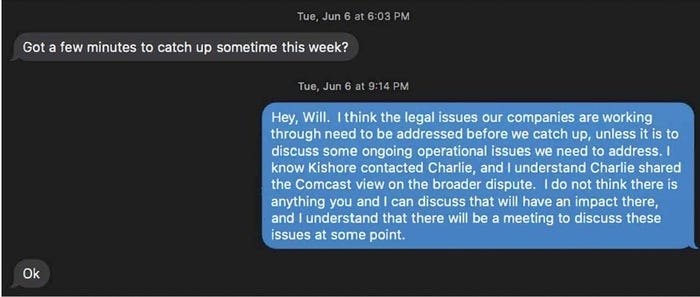Comcast sues MaxLinear for breach of contract
Comcast alleges that MaxLinear is trying to scuttle agreements that include a no-sue clause while a new company under the Entropic banner that now owns an array of MaxLinear patents is accusing Comcast of infringement.

In a complicated case that has received little notice, Comcast is suing chipmaker MaxLinear for breach of contract for attempting to terminate two agreements that provide ongoing support for millions of broadband gateways and set-tops that use MaxLinear technology.
The Comcast-MaxLinear legal entanglement sends ripples across a handful of top US cable and satellite service operators. Comcast's lawsuit, filed with a New York court on May 26, 2023, has linkages to a wave of separate lawsuits filed in February 2023 in a California court by a separate entity called Entropic Communications LLC (Entropic LLC) targeting Comcast, Charter Communications, Cox Communications, Dish Network and DirecTV, claiming they are infringing on 20 patents related to Multimedia over Coax Alliance (MoCA) technology.
MoCA is an IP-based technology embedded in certain broadband gateways and set-tops to distribute data over home coax networks and, in some instances, for access networks. MoCA got its start supporting whole-home DVR offerings. Entropic Communications Inc. (Entropic Inc.) was a pioneering MoCA chipset company that MaxLinear acquired in 2015 for $287 million.
The relatively new Entropic LLC unit – considered a "non-practicing entity" or a "patent troll" depending on one's observation point – obtained ownership of certain MaxLinear patents and intellectual property, including patents related to MoCA, in early 2021, according to court documents and Entropic LLC's own website. Entropic LLC touts a portfolio that includes 298 patent assets, including those covering multiple versions of MoCA. Entropic LLC's website also notes that the company is using the Entropic trademark under license from MaxLinear.
Comcast: MaxLinear tried to scuttle deal with no-sue provision
Comcast alleges that MaxLinear attempted to terminate its Vendor Support Agreement (VSA) and related Statement of Work (SOW) agreement used to provide ongoing service and support for certain broadband gateways, and did so after MaxLinear signed over its patents to Entropic LLC. Comcast estimates that more than 14 million devices, including certain XB6 and XB7 gateways made by CommScope, contain MaxLinear tech.
Comcast said MaxLinear's termination letter was dated May 18, but was not received by the company's procurement team until May 23, and was sent "with no notice and without any recognition of the applicable termination provisions." Comcast said MaxLinear may terminate the VSA only upon 90 days prior written notice to Comcast, if there has been no active statement of work for a period of one year (Comcast claims its SOW with MaxLinear was active at the time of its lawsuit against MaxLinear). Comcast said it told MaxLinear via a letter dated May 24 that the vendor was in breach of both agreements and to confirm that it was withdrawing its supposed termination notice.
The critical detail, Comcast argues, is that the VSA MaxLinear tried to terminate contains an express "covenant not to sue" Comcast, and covers the patents, "irrespective of who owns them." The MaxLinear patents, Comcast argued, "remain encumbered by the VSA's covenant not to sue, even after the assignment to Entropic [LLC]."
Entropic lawsuits a source of tension
Comcast's complaint also highlights how the Entropic LLC lawsuits have become a significant source of tension and friction between Comcast and MaxLinear, which is developing silicon for DOCSIS 4.0 equipment. There's a history of tension between the companies. MaxLinear and Cisco Systems were among a group of suppliers that spent millions developing Full Duplex (FDX) DOCSIS technology for Comcast, but those efforts did not bear fruit after Comcast later decided to go in a different direction, according to multiple industry sources familiar with the situation.
According to Comcast's lawsuit, William Torgerson, VP and GM of MaxLinear's broadband group, met with Jon Cave, Comcast's SVP of broadband, Xfinity Home and entertainment devices, on May 18 through normal course of business. Comcast said Torgerson raised the topic of the Entropic LLC lawsuits and "questioned how those might impact Comcast's and MaxLinear's relationship."
Comcast said Torgerson told Cave that MaxLinear's CEO Kishore Seendripu intended to terminate the VSA, and "implied" that such termination "was an attempt to terminate the Covenant Not to Sue so that Entropic [LLC] would be free to pursue its patent infringement claims against Comcast."
Torgerson, Comcast added, stated that Seendripu would abide by the terms of the VSA only if Comcast could convince him that "there is a solid chance of business" between MaxLinear and Comcast.
Comcast said the following day, on May 19, Seendripu sent an email to Charlie Herrin, Comcast's president of technology, product and experience, requesting a meeting to discuss "opportunities to work together" but made no mention of the termination of the VSA or SOW. Then, on May 23, Comcast's procurement team received a letter from MaxLinear CFO Steven Litchfield that purported to terminate the VSA and SOW. Peter Kiriacoulacos, Comcast's chief procurement officer, responded the next day that the letter constituted a breach of the VSA and SOW.
Then, on May 25, Herrin met with Seendripu in a remote meeting and informed the MaxLinear exec that attempts to terminate the deals were improper. Comcast said Seendripu responded that MaxLinear's legal team advised him to cancel the VSA in order to free the MaxLinear patents from the VSA's protections, including the covenant not to sue. Ultimately, Seendripu did not agree to withdraw the termination letter, Comcast said.
A text exchange between Cave and Torgerson embedded in Comcast's complaint illustrates how the Entropic LLC lawsuits targeting Comcast have complicated the business relationship between the operator and the chipmaker:

(Source: Comcast complaint againt MaxLinear)
MaxLinear 'retains a financial interest' in the Entropic lawsuits, Comcast claims
Comcast also believes MaxLinear is positioned to gain financially from the Entropic LLC lawsuits filed with the United States District Court for the Central District of California.
"MaxLinear has attempted to terminate the VSA and SOW in breach of both Agreements as part of a transparent attempt to further its financial interests in patent litigation," Comcast said in its complaint filed with the US District Court Southern District of New York. "Rather than deal with the realities of the VSA's express terms, MaxLinear apparently thinks it can render the covenant irrelevant by terminating – improperly – the VSA and SOW. It cannot do so, and its attempted termination is a clear violation of both Agreements," Comcast argued.
How MaxLinear would gain financially through the Entropic LLC-led lawsuits filed against Comcast and other service operators is not clear, at least beyond the fact that MaxLinear assigned ownership of certain patents to Entropic LLC and that it licensed the Entropic trademark to Entropic LLC.
Comcast maintains that MaxLinear "retains a financial interest" in the patent infringement claims being made by Entropic LLC and has obligated itself to help Entropic LLC in the "monetization venture" against Comcast and other US service providers.
Comcast also argued that MaxLinear did not disclose to Entropic LLC the VSA's covenant not to sue Comcast.
According to the complaint, Kiriacoulacos spoke by phone on April 28, 2023, to MaxLinear's Seendripu and asked him if he was aware of the covenant not to sue and conveyed that Comcast would like for Entropic LLC to drop the California lawsuits, given the no-sue covenant.
"Mr. Seendripu conveyed that MaxLinear would not take any action to honor the Covenant Not to Sue, but acknowledged that MaxLinear had a financial interest in the California Lawsuits," Comcast explained.
MaxLinear declined to comment when asked to describe its business relationship with Entropic LLC.
According to court documents, Entropic LLC is led by Boris Teksler, an exec who has held patent licensing and intellectual property roles at companies such as Apple and Hewlett-Packard and once held a top technology management role at Technicolor.
Teksler's LinkedIn profile currently lists him as president and CEO of Mosaid Technologies, a company with a portfolio of more than 2,000 patents and patent applications under management. As of this writing, messages left with Teksler, a phone number listed for Entropic LLC and legal reps for Entropic LLC have not been returned.
Mondaq, an online knowledge site tapped into partners such as Bloomberg, Dow Jones and Thomson Reuters, suggests there's a linkage between Entropic LLC and Fortress Investment Group, a company that has more than $44 billion assets under management.
The Entropic lawsuits
Comcast's suit against MaxLinear stems to a pair of lawsuits Entropic LLC filed in February against Comcast, alleging that the cable operator is infringing on almost two dozen MoCA-related patents. Entropic LLC filed similar suits against Charter, Cox, DirecTV and Dish. Efforts are underway to consolidate those cases. It's possible that the cases will be resolved sometime this fall.
Entropic LLC contends that the group of operators are using MoCA-based products without paying licensing fees for patents that underpin the technology. In the suits targeting Comcast, Entropic LLC alleges that several gateways and set-tops used by the operator made by suppliers such as Arris and Pace (both now part of CommScope) and Samsung, among others, are subject to the infringement claims.
Entropic LLC goes on to accuse Comcast of using MoCA products and functionality not provided by Entropic Inc., the company acquired by MaxLinear in 2015. Comcast, Entropic LLC claimed, "failed to investigate whether Entropic Inc. authorized the use of Entropic Inc.'s patents for such activity."
Entropic LLC does not specify in the filing which non-Entropic Inc. components it is referencing. Examples of chipmakers that developed MoCA silicon over the years include ViXS Systems, a company now part of Pixelworks that was once engaged in a lawsuit with Entropic Inc. that ultimately was settled in 2014. ViXS Systems sold its legacy MoCA business, including compensation for a non-exclusive patent license, to MaxLinear in 2017. Broadcom entered the MoCA game via its 2007 acquisition of Octalica, but has since backed out of the MoCA market.
Intel, Mstar Semiconductor, Texas Instruments, PMC-Sierra, MediaTek and Zoran Microelectronics Ltd are among silicon companies that were former members of the MoCA organization.
Cloud hovers over MaxLinear and MoCA tech
The flurry of activity centered on MaxLinear and MoCA intellectual property is giving pause to some operators regarding near-term engagement with the vendor and future use of MoCA technology.
"You can't talk to them" as the lawsuits play out, a cable operator exec with knowledge of the current wave of lawsuits said of MaxLinear. "It's not a great way to grow trust and goodwill."
Entropic LLC's lawsuits against a handful of major service providers also casts a cloud over MoCA, a technology that has lost some of its relevance as set-tops, media players and broadband gateways rely more heavily on Wi-Fi for in-home distribution. Meanwhile, the MoCA organization has altered its view of Wi-Fi in recent years. Rather than seeing Wi-Fi as a competitive technology, it is focusing on playing a complementary role by providing backhaul for newer generations of Wi-Fi.
Among recent use cases, Frontier Communications is using MoCA to improve the quality and speed of installs – for example, using MoCA to connect optical network terminals to eero gateways for the company's 1-Gig and 2-Gig broadband services and to connect eero Wi-Fi extenders to support hard-to-reach areas in large homes and multiple-dwelling units (MDUs).
MoCA also has found some other outlets, including its use as an access network technology.
The Multimedia over Coax Alliance, led by MaxLinear Director of Standards Engineering Marcos Martínez Vázquez as the organization's president, said it "complied with a subpoena request from Entropic Communications, LLC, following the Alliance's internal procedures."
Related posts:
MaxLinear Swallows Up Entropic (press release)
— Jeff Baumgartner, Senior Editor, Light Reading
About the Author(s)
You May Also Like




.jpg?width=300&auto=webp&quality=80&disable=upscale)







